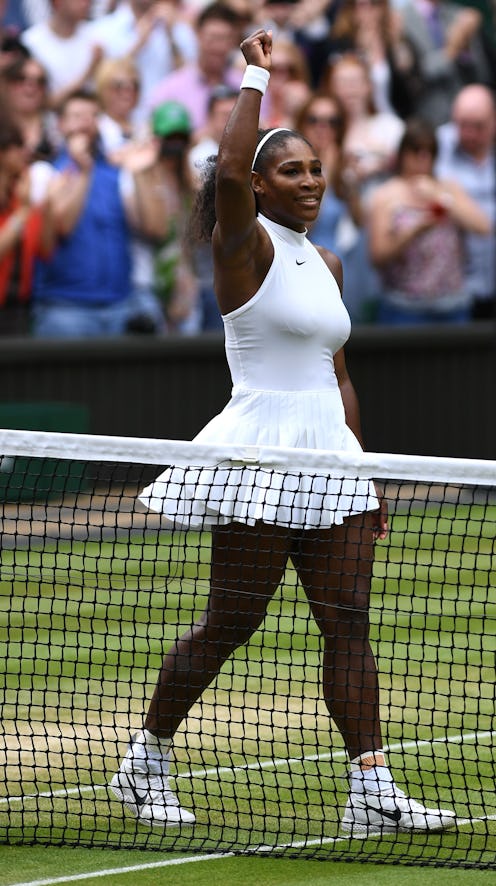News
Serena Williams' Wimbledon Win Photo Is Important
Saturday was a huge day for tennis legend Serena Williams. The 34-year-old tennis pro earned her 22nd Grand Slam title at Wimbledon — tying with the former world No. 1-ranked Steffi Graf's Open-era record. After conquering Germany's Angelique Kerber, a visibly tired Williams was photographed raising her right fist in the air in triumph with a smile on her face. The clenched fist is known as a symbol of power, support, and solidarity within the black community. And her proud display of the symbolic gesture — in front of thousands at Wimbledon and millions all over the word watching at home — spoke volumes.
The move comes at a time when racial tension is running high across the nation. On Tuesday, 37-year-old Alton Sterling was killed in Baton Rouge, LA, on Wednesday 32-year-olf Philando Castile was killed during a traffic stop in Minnesota, and Thursday, five police officers were killed during a Black Lives Matter protest in Dallas, Texas. In the wake of these tragedies, Williams' move is a bold one. As I saw photo after photo of Williams' raised fist make their way across the Internet, I couldn't help but note the significance of one obvious fact: Williams is a black woman who has experienced many obstacles in her chosen profession merely because of the color of her skin, and she's shattered them time and time again. She's even spoken out about the obstacles she faces in the sports world: As she told WIRED magazine last year, "I'm a black woman, and I am in a sport that wasn't really meant for black people." And now, here she is raising a fist in the air after claiming a major championship and breaking a historic record — displaying a symbol of power within the black community proudly and freely, wordlessly telling those who have projected hate toward her that they're wrong and she's won.
This is huge.
Williams, due to the simple fact she is a pro tennis player, has faced racist comments about black women throughout her career — ones that wrongly deem black women hyper-masculine, unattractive, and not deserving of respect. And, as a black woman in America too, I have in the past as well. In her classic book, Ain't I a Woman: Black Women and Feminism, author Bell Hooks expanded on the origin of these common racist notions, stating images of the black woman intended to be positive are usually those that depict us as the "longsuffering, maternal figure whose most endearing characteristic is her self-sacrificing self-denial for those who she loves." Additionally, in her 1990 book, Black Feminist Thought , Patricia Hill Collins commented: "From the mammies, jezebels, and breeder women of slavery to the smiling Aunt Jemimas on pancake mix boxes, ubiquitous Black prostitutes, and ever-present welfare mothers of contemporary popular culture, negative stereotypes applied to African-American women have been fundamental to Black women’s oppression." These stereotypes are what many have been conditioned to think of when we see black women in America. Because Williams uses her platform to give a different view, and she has squashed any and all stereotypes in the process.
So, as I gazed at photos of Williams with her fist raised and her head held high, I couldn't help but feel victorious myself. In a society that places black women in a box — a very, very small box — and dismisses us using harmful stereotypes and erasure, Williams is an inspiring, stereotype-shattering figure. With Serena's win and her victorious display of celebration, we all win.
Of course, I am not placing the burden of improving the social, economic and political status of black women on Williams' shoulders, but Williams is doing so, and she inspires me to do so as well. She inspires me to squash stereotypes, to be unapologetically black, and to be unashamed of who I am in the face of racism and sexism. Each time Williams secures a title, wins an award or graces a magazine cover, the world is seeing a black woman who does not conform to the harmful tropes most have been spoon-fed from a young age.
This image, of course, isn't the first time Williams has subverted stereotypes and come out on top: it's just one of the times. She does it on a near-daily basis, partially by continuously embracing who she is.
Case-in-point: When talking to Good Morning America, Williams addressed her body shamers and declared her love for herself and her body. She said, "I embrace me, and I love how I look." This, like the image of Williams at Wimbledon, is so important.
Additionally, Williams' social media accounts are riddled with body positive posts, some show the athlete serving a seductive pose for a mirror photo or lounging in a revealing bodysuit for a magazine cover and others provide encouraging messages like "strong is beautiful." When I see these images I think, "If she can be proud of her body, I can too." And I'd like to think that when the world sees these images, we all think, "that body type is beautiful, and deserving of respect."
Of course, Williams is not the first or the only black woman to break these stereotypes that have long plagued black women in this country. But her platform gives her an advantage many black women don't have. In a society where celebrity is idolized, Williams' voice is one of authority. And using that voice and her platform, Williams refuses to bow down to European standards of beauty and conduct.
Through the way she simply presents herself, Williams proves that, for the black woman, beautiful and unapologetically black are synonymous. And when she wins, we all win.
